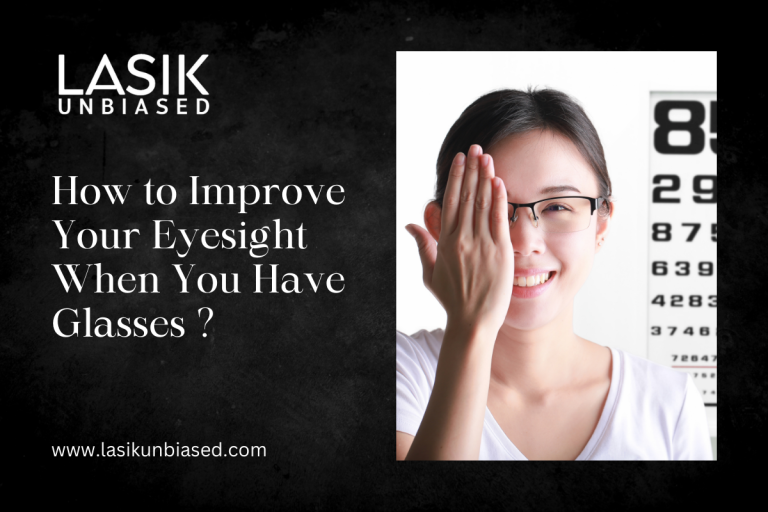Understanding Vision and the Role of Glasses
Wearing glasses corrects vision problems like nearsightedness, farsightedness, and astigmatism, but it does not improve eyesight naturally. Many wonder if they can strengthen their eyes and reduce their dependence on glasses. While glasses do not worsen your vision, certain habits and lifestyle changes can help maintain and potentially enhance your eyesight. Following a proper eye care routine, practising eye exercises, and maintaining a healthy lifestyle can support better vision even while wearing glasses.
Eye Exercises to Strengthen Vision
1. Palming Technique
Palming relaxes the eye muscles and reduces strain. Keep them covered for a few minutes while breathing deeply. This simple Exercise relieves tension and refreshes the eyes.
2. Focus Shifting
This Exercise helps improve focus and flexibility in your eyes. Slowly bring it closer to your nose while maintaining focus, then move it back again. Repeat this process several times to train your eyes to shift focus more effectively.
3. Eye Rolling
Rolling your eyes in different directions can enhance flexibility. Start by looking up, then slowly move your gaze in a circular motion. Repeat clockwise and counterclockwise. This Exercise relaxes the eye muscles and improves mobility.
4. Near and Far Focus
This technique improves the ability to adjust between different distances. Look at an object close to you briefly, then shift your focus to something far away. Repeat several times to strengthen your eye muscles and enhance your focusing ability.
5. Blinking Exercise
Frequent blinking keeps the eyes moist and reduces dryness. If you spend long hours on screens, consciously blink every few seconds to prevent strain and refresh your vision.
Healthy Lifestyle Habits for Better Vision
1. Maintain a Nutrient-Rich Diet
A balanced diet plays a crucial role in maintaining good eyesight. Essential nutrients for eye health include:
- Vitamin A (found in carrots, sweet potatoes, and spinach) to prevent night blindness.
- Omega-3 fatty acids (from fish, walnuts, and flaxseeds) reduce dry eyes.
- Vitamin C (from citrus fruits and bell peppers) to protect against eye diseases.
- Zinc (from nuts and beans) to support good vision in low light.
2. Stay Hydrated
Dehydration can cause dry and irritated eyes. Drinking plenty of water throughout the day helps maintain proper tear production, keeping your eyes comfortable and healthy.
3. Reduce Screen Time
Excessive screen exposure can strain the eyes and contribute to digital eye fatigue. This helps prevent eye strain and keeps vision sharp.
4. Get Sufficient Sleep
Adequate sleep allows your eyes to rest and recover from daily strain. Lack of sleep can cause eye fatigue, dryness, and blurry vision. Aim for 7-8 hours of quality sleep each night to support overall eye health.
5. Protect Your Eyes from UV Rays
Prolonged exposure to UV rays can damage the eyes and increase the risk of cataracts and macular degeneration. Always wear sunglasses with UV protection outdoors to shield your eyes from harmful rays.
Reducing Dependence on Glasses
While some people believe that wearing glasses worsens their eyesight, this is a myth. Glasses do not weaken vision; they correct refractive errors. However, if you wish to reduce your dependency on glasses, consider these methods:
1. Practice Good Posture While Reading
Sitting too close to a screen or book can cause unnecessary strain. To prevent eye fatigue, keep an appropriate distance from your reading materials and ensure proper lighting.
2. Use the Right Prescription
The wrong prescription can cause headaches, eye strain, and worsening vision. Get regular eye exams to ensure your glasses provide the correct correction level.
3. Try Vision Therapy
Vision therapy is a specialized program designed to strengthen the eye muscles and improve coordination. It includes structured exercises that help enhance visual performance over time.
4. Wear Glasses Only When Necessary
For mild prescriptions, using glasses only when needed (such as while reading or driving) may help train the eyes to focus better naturally. However, this should only be done under the guidance of an eye specialist.
5. Consider Contact Lenses or LASIK
Contact lenses can be a good alternative to glasses if you want to reduce your reliance on them. LASIK surgery is another option for permanent vision correction, but it requires eligibility based on eye health.
Eye Care Tips for Long-Term Vision Health
1. Avoid Rubbing Your Eyes
Rubbing your eyes can introduce bacteria and irritate them.
2. Take Breaks from Close-Up Work
Extended periods of reading or screen use can cause eye strain. Take frequent breaks to rest your eyes and maintain focus.
3. Keep Your Glasses Clean
Smudged or dirty lenses can blur vision. To maintain clear sight, regularly clean your glasses with a microfiber cloth and lens cleaner.
4. Exercise Regularly
Activities like yoga, jogging, and stretching can help reduce eye strain and improve overall well-being.
5. Regular Eye Check-Ups
Routine eye exams help detect vision changes early and ensure you have the correct prescription. Your eye doctor can also monitor for conditions like glaucoma or cataracts that may affect vision over time.
Improving eyesight while wearing glasses requires a combination of healthy habits, eye exercises, and proper eye care. While glasses do not weaken vision, strengthening your eye muscles and reducing strain can enhance visual clarity and comfort. Maintaining a nutrient-rich diet, protecting your eyes from UV rays, and practising relaxation techniques can support long-term vision health. If you experience frequent eye strain or worsening vision, consult an eye specialist for personalized advice. With the right approach, you can keep your eyes healthy and strong, even with glasses.


